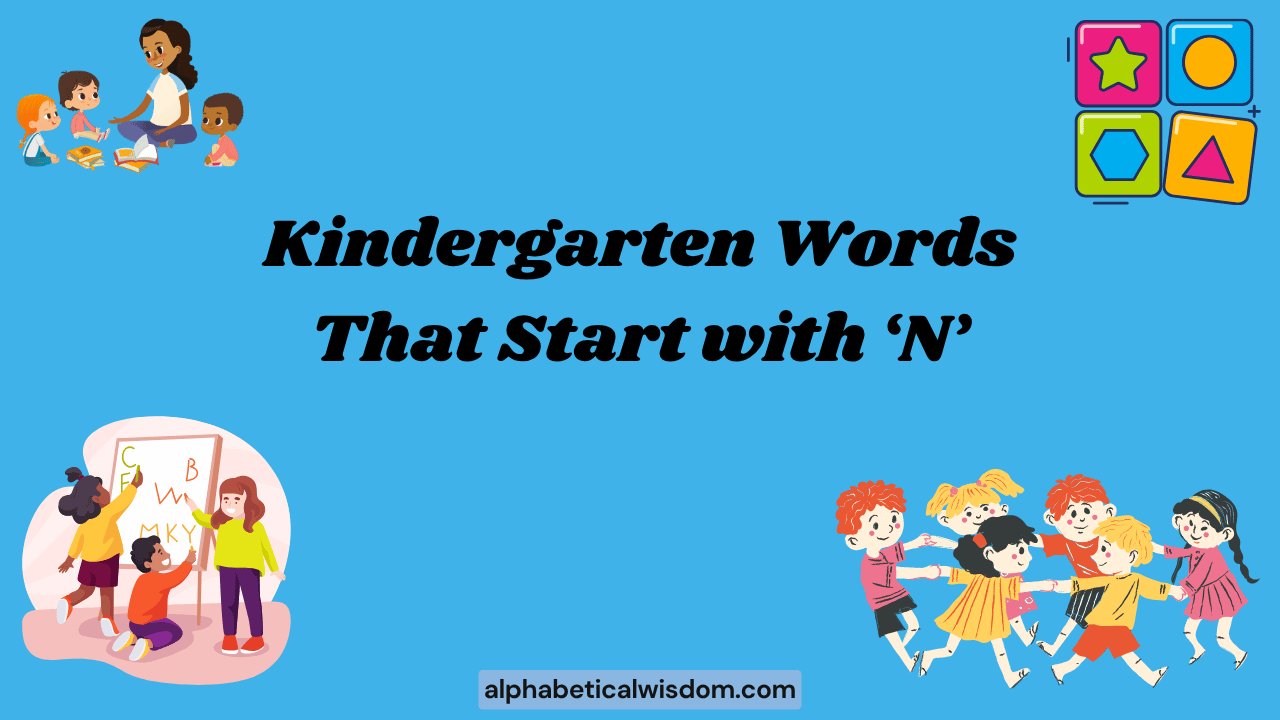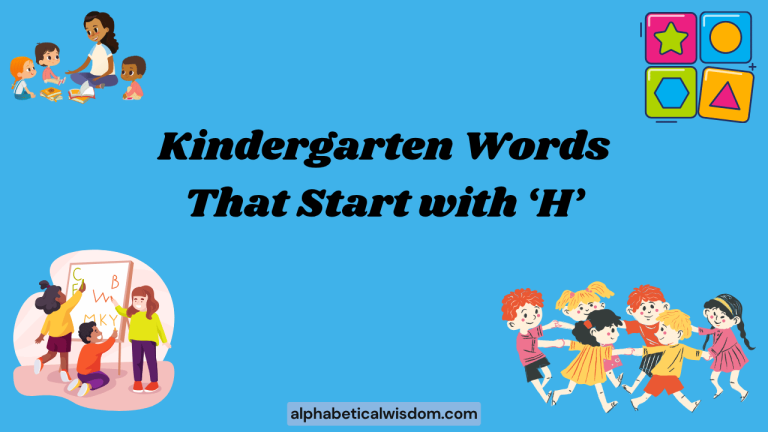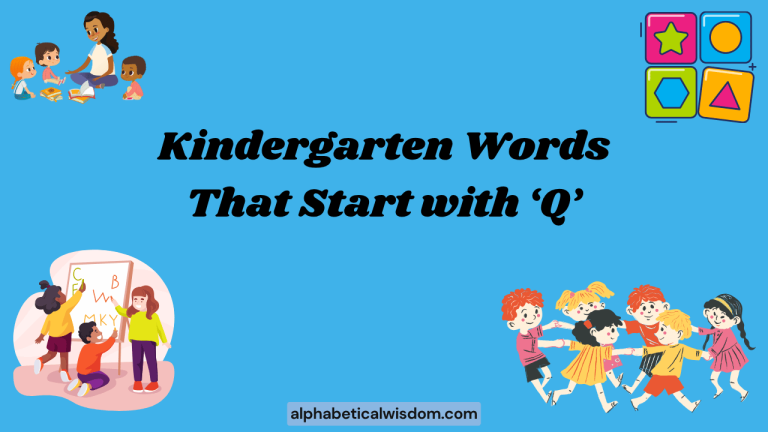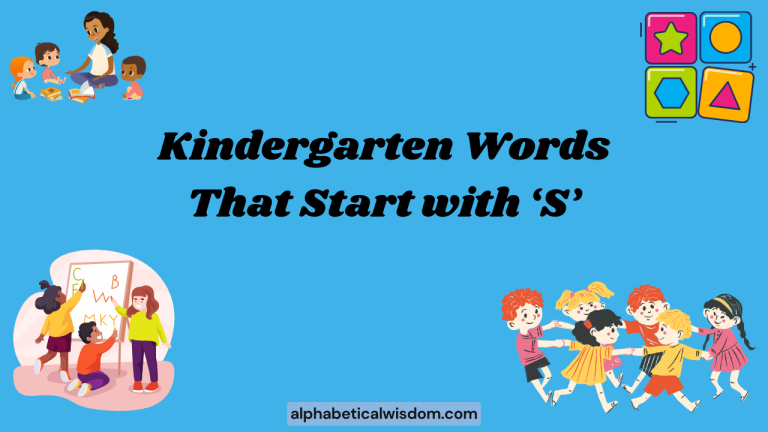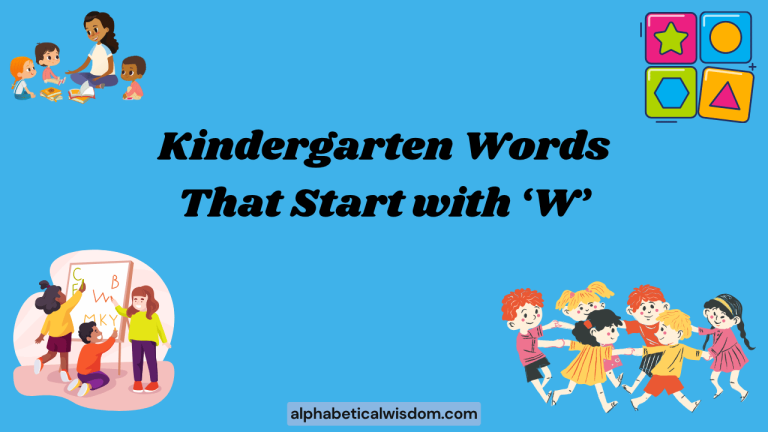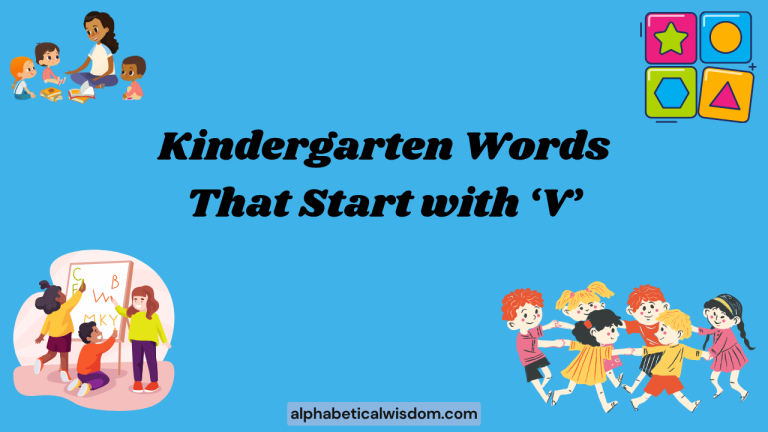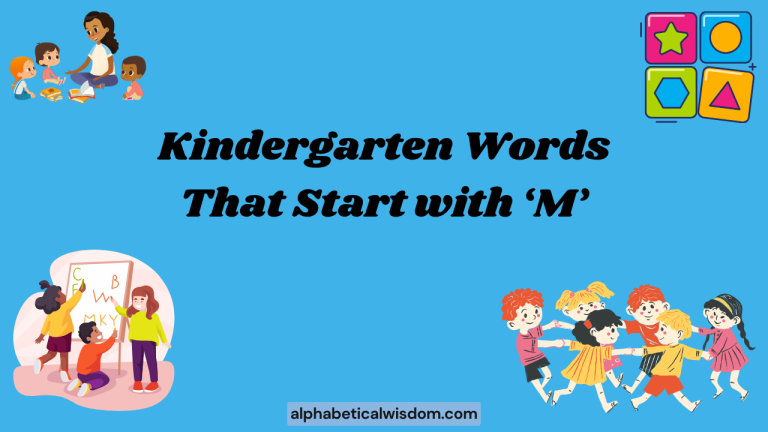Kindergarten Words: A Comprehensive Guide to Words Starting with N
Learning new words is a crucial step in a child’s early education, and mastering words that begin with ‘N’ is no exception. This article provides a detailed guide to kindergarten-level words starting with ‘N,’ focusing on vocabulary, usage, and interactive exercises.
This resource is designed for parents, teachers, and young learners aiming to expand their vocabulary and improve their language skills. By understanding these words, children will build a solid foundation for reading, writing, and communication.
Table of Contents
- Introduction
- Definition of Kindergarten Words Starting with N
- Structural Breakdown of ‘N’ Words
- Categories of ‘N’ Words for Kindergarten
- Examples of Kindergarten Words Starting with N
- Usage Rules for ‘N’ Words
- Common Mistakes with ‘N’ Words
- Practice Exercises
- Advanced Topics: Expanding Vocabulary
- FAQ: Frequently Asked Questions
- Conclusion
Definition of Kindergarten Words Starting with N
Kindergarten words starting with ‘N’ are foundational vocabulary terms that young children learn to recognize, understand, and use in their early literacy development. These words typically represent simple objects, actions, or concepts that are familiar to a child’s everyday experiences.
The primary function of introducing these words is to build a child’s reading and writing skills, comprehension, and overall communication abilities. These words are often nouns, verbs, and adjectives that are easy to pronounce and relate to.
In the context of early childhood education, ‘N’ words help in developing phonemic awareness, which is the ability to hear and manipulate the individual sounds in spoken words. This is a critical skill for learning to read.
Furthermore, these words provide a basis for understanding sentence structure and grammar. By learning how to use ‘N’ words correctly, children can express themselves more clearly and effectively.
Structural Breakdown of ‘N’ Words
Understanding the structure of words starting with ‘N’ involves examining their phonetic components and grammatical roles. Most ‘N’ words in kindergarten are simple, typically consisting of one or two syllables.
These words are usually structured as follows:
- Beginning Sound: The letter ‘N’ represents a nasal consonant sound, produced by air flowing through the nose.
- Vowel Sound: Following the ‘N’ sound is a vowel sound, which can vary (e.g., /æ/ in “nap,” /iː/ in “needle”).
- Ending Sound: The word often concludes with another consonant sound (e.g., /t/ in “net,” /d/ in “nod”) or a silent ‘e’ that modifies the vowel sound (e.g., “name”).
Grammatically, ‘N’ words can function as different parts of speech:
- Nouns: Words that name people, places, things, or ideas (e.g., nest, nose, night).
- Verbs: Words that describe actions or states of being (e.g., nod, name).
- Adjectives: Words that describe or modify nouns (e.g., new, nice).
Categories of ‘N’ Words for Kindergarten
To better organize and understand ‘N’ words, they can be grouped into different categories based on their meaning and usage. Here are some common categories:
Nature Words
Words related to the natural world.
People and Relationships
Words that describe people or relationships.
Objects and Things
Words that name common objects.
Actions and Verbs
Words that describe actions.
Descriptive Words
Adjectives that describe qualities or characteristics.
Examples of Kindergarten Words Starting with N
Below are extensive examples of kindergarten words starting with ‘N,’ categorized to aid understanding and memorization. Each table provides a variety of words, demonstrating different usages and meanings.
Nature Words
This table presents words related to nature, helping children connect with the environment.
| Word | Example Sentence |
|---|---|
| Nest | The birds built a nest in the tree. |
| Night | The stars shine brightly at night. |
| Nut | The squirrel buried a nut in the ground. |
| Newt | We saw a little newt near the pond. |
| Nectar | The bee drinks nectar from the flower. |
| Needle | Pine trees have needles instead of leaves. |
| Nightingale | The nightingale sang a beautiful song. |
| North | The wind is blowing from the north. |
| Nasturtium | The garden has a beautiful nasturtium flower. |
| Nebula | The telescope showed a colorful nebula far away. |
| Nymph | A dragonfly starts as a nymph in the water. |
| Noble Fir | We got a Noble Fir for our Christmas tree. |
| Nettle | Be careful not to touch the nettle plant. |
| Navel Orange | I ate a juicy Navel Orange for breakfast. |
| New Moon | Tonight is the night of the New Moon. |
| Nard | The fragrant nard plant grows in the garden. |
| Ninebark | The Ninebark shrub has peeling bark. |
| Nolina | The Nolina plant is drought-tolerant. |
| Nandina | The Nandina berries are bright red. |
| Norway Maple | The Norway Maple tree has broad leaves. |
| Nymphoides | The Nymphoides flowers float on the water. |
| Nolina | The Nolina plant is drought-tolerant. |
| Neem | We use Neem oil on the plants. |
| Noni | Noni is a tropical fruit. |
| Naseberry | I love to eat Naseberry. |
| Naranjilla | Naranjilla is a fruit used to make juice. |
| Nectarine | A Nectarine is so sweet. |
| Naseberry | Naseberry is a fruit I like. |
People and Relationships
This table focuses on words related to people and their relationships, aiding in social understanding.
| Word | Example Sentence |
|---|---|
| Name | My name is Lily. |
| Nephew | My sister’s son is my nephew. |
| Niece | My brother’s daughter is my niece. |
| Neighbor | Our neighbor is very friendly. |
| Nurse | The nurse helped me feel better. |
| Newcomer | The newcomer was welcomed to the classroom. |
| Nominee | She was a nominee for class representative. |
| Narrator | The narrator told the story. |
| Nobleman | The nobleman was very respected. |
| Nun | The nun helped in the church. |
| Newscaster | The newscaster read the news. |
| Novice | The novice learned quickly. |
| Notary | The notary stamped the document. |
| Neonate | The neonate was sleeping soundly. |
| Native | She is a native of this country. |
| Negotiator | The negotiator helped reach a deal. |
| Navigator | The navigator showed us the way. |
| Networker | He is a skilled networker. |
| Naturalist | The naturalist studied the wildlife. |
| Neurologist | The neurologist examined the patient. |
| Nanny | The nanny watched the children. |
| Novitiate | The novitiate is training to become a monk. |
| Nincompoop | Don’t be a nincompoop. |
| Nymphomaniac | The nymphomaniac was out of control. |
| Nailer | The nailer fixed the fence. |
| Nabab | The nabab was a wealthy man. |
| Nark | The nark told on the boy. |
| Nark | The nark told on the boy. |
Objects and Things
This table provides words for common objects, helping children identify items in their environment.
| Word | Example Sentence |
|---|---|
| Net | We caught fish with a net. |
| Nose | I smell flowers with my nose. |
| Neck | I wear a necklace around my neck. |
| Notebook | I write notes in my notebook. |
| Needle | My grandma uses a needle to sew. |
| Nail | We used a nail to hang the picture. |
| Napkin | Use a napkin to wipe your mouth. |
| Number | What is your favorite number? |
| Nickel | I have a nickel in my pocket. |
| Noodles | I love to eat noodles with sauce. |
| Necklace | She wears a beautiful necklace. |
| Nightgown | I wear a nightgown to bed. |
| Novel | He is reading a long novel. |
| Newspaper | My dad reads the newspaper every morning. |
| Notepad | I keep a notepad by the phone. |
| Nail Polish | She put on red nail polish. |
| Navigator | The navigator showed us the way. |
| Nightstand | The lamp sits on the nightstand. |
| Nunchucks | The man was skilled with nunchucks. |
| Name Tag | She wore a name tag at the event. |
| Nutcracker | We used a Nutcracker to open the nut. |
| Nose Ring | She has a nose ring. |
| Nebulizer | The boy used a nebulizer. |
| Nutshell | I can explain it in a nutshell. |
| Needlepoint | I like to do Needlepoint. |
| Nightcap | He wore a Nightcap at night. |
| Nock | The Nock was adjusted on the bow. |
| Nonagon | The shape was a Nonagon. |
Actions and Verbs
This table lists action words, helping children understand different activities.
| Word | Example Sentence |
|---|---|
| Nod | I nod my head to say yes. |
| Name | I name my doll. |
| Nap | I nap in the afternoon. |
| Nibble | The mouse nibbled on the cheese. |
| Navigate | We navigate the boat. |
| Nestle | The cat nestled in the blanket. |
| Notify | Please notify me when you are ready. |
| Note | I note the changes. |
| Number | Please number the pages. |
| Nuzzle | The baby nuzzled against the mother. |
| Nominate | They nominate her for the award. |
| Need | I need help. |
| Neglect | Don’t neglect your studies. |
| Nourish | The food will nourish your body. |
| Nullify | The contract was nullified. |
| Nix | I nix that idea. |
| Nudge | I nudge him. |
| Nail | I nail the wood together. |
| Narrate | I narrate the story. |
| Natter | I natter with my friends. |
| Nuke | I nuke the food in the microwave. |
| Nuzzle | I nuzzle against the blanket. |
| Nosh | I nosh on snacks. |
| Nod off | I nod off on the couch. |
| Neutralize | I neutralize the situation. |
| Nick | I nick my finger. |
| Nitpick | Don’t nitpick me. |
| Nip | I nip the flower. |
Descriptive Words
This table includes adjectives, helping children describe things with greater detail.
| Word | Example Sentence |
|---|---|
| New | I have a new toy. |
| Nice | She is a nice girl. |
| Neat | My room is neat and tidy. |
| Nifty | That’s a nifty trick! |
| Nimble | The cat is very nimble. |
| Noisy | The children are very noisy. |
| Notable | That’s a notable achievement. |
| Naked | The tree is naked in winter. |
| Natural | This is a natural product. |
| Nearby | The store is nearby. |
| Narrow | The road is very narrow. |
| Nasty | The medicine tastes nasty. |
| Naval | The naval ship sailed the sea. |
| Nebulous | The concept was nebulous. |
| Needful | It’s a needful thing. |
| Needy | The needy family received help. |
| Negative | The test result was negative. |
| Negligible | The effect was negligible. |
| Neutral | The color is neutral. |
| Newfangled | The device is newfangled. |
| Nightly | The show is nightly. |
| Nitrous | The gas is nitrous. |
| Nival | The climate is nival. |
| Noetic | The understanding is noetic. |
| Nomadic | The tribe is nomadic. |
| Nonchalant | He seemed nonchalant. |
| Nondescript | The building was nondescript. |
| Normal | The temperature is normal. |
Usage Rules for ‘N’ Words
Understanding the basic rules for using ‘N’ words is essential for correct grammar and clear communication. Here are some key rules:
- Nouns: Use nouns to name specific objects, people, or places. Ensure the noun agrees in number with the verb (singular or plural).
- Verbs: Use verbs to describe actions. Pay attention to verb tense (present, past, future) to convey the correct timing of the action.
- Adjectives: Use adjectives to describe nouns. Place adjectives before the noun they modify (e.g., “a new car”).
Exceptions and Special Cases:
Some ‘N’ words can function as multiple parts of speech depending on the context. For example, “name” can be a noun (My name is John) or a verb (I will name my doll). Be mindful of the sentence structure to determine the correct usage.
Common Mistakes with ‘N’ Words
Even with a good understanding of ‘N’ words, some common mistakes can occur. Recognizing these errors can help children avoid them.
| Incorrect | Correct | Explanation |
|---|---|---|
| I name the house. | My name is Lily. | Confusing the verb “name” with the noun “name.” |
| I have new. | I have a new toy. | Forgetting to include the noun after the adjective “new.” |
| The bird make a nest. | The bird makes a nest. | Incorrect verb conjugation (singular subject requires singular verb). |
| I see one night. | I see the night. | Missing the article “the” before a specific noun. |
| The boy is nice. | The boy are nice. | Subject-verb agreement. |
Practice Exercises
These exercises will help reinforce the understanding of ‘N’ words. Each exercise focuses on different aspects of vocabulary and usage.
Exercise 1: Fill in the Blanks
Complete the sentences with the correct ‘N’ word from the word bank:
Word Bank: nest, night, name, nose, new
| Question | Answer |
|---|---|
| 1. My _______ is Alex. | name |
| 2. The bird lives in a _______. | nest |
| 3. I can smell with my _______. | nose |
| 4. The stars come out at _______. | night |
| 5. I have a _______ toy. | new |
| 6. I _____ my dog. | name |
| 7. The moon is out at _____. | night |
| 8. The puppy is ____. | new |
| 9. The bird sits on the ______. | nest |
| 10. She scratched her ______. | nose |
Exercise 2: True or False
Determine if the following sentences are true or false:
| Statement | Answer |
|---|---|
| 1. A nest is where birds live. | True |
| 2. The sun shines at night. | False |
| 3. Your name is what you are called. | True |
| 4. You smell with your ears. | False |
| 5. Old things are new. | False |
| 6. The nest is made of wood. | True |
| 7. The moon shines at night. | True |
| 8. The new car is old. | False |
| 9. The boy has no nose. | False |
| 10. I name my cat. | True |
Exercise 3: Matching
Match the word to its correct definition:
| Word | Definition | Answer |
|---|---|---|
| 1. Nest | a. A period of darkness between sunset and sunrise. | 1-b |
| 2. Night | b. A structure built by birds for laying eggs. | 2-a |
| 3. Name | c. A word used to identify a person, place, or thing. | 3-c |
| 4. Nose | d. The part of the face used for smelling. | 4-d |
| 5. New | e. Recently made or obtained. | 5-e |
| 6. Nifty | a. Something nice | 6-a |
| 7. Narrow | b. Not wide | 7-b |
| 8. Nasty | c. Unpleasant | 8-c |
| 9. Nimble | d. Quick and light in movement | 9-d |
| 10. Noisy | e. Making a lot of noise | 10-e |
Advanced Topics: Expanding Vocabulary
For advanced learners, expanding vocabulary with more complex ‘N’ words can be beneficial. Consider introducing words like “narrate,” “negotiate,” and “nuance.” Understanding prefixes and suffixes can also help in deciphering the meaning of unfamiliar words.
Additionally, exploring the etymology (origin) of ‘N’ words can provide a deeper understanding of their meaning and usage. For example, the word “navigate” comes from the Latin word “navis,” meaning “ship.”
FAQ: Frequently Asked Questions
- What is the importance of learning ‘N’ words in kindergarten?
Learning ‘N’ words in kindergarten is crucial for building a strong foundation in reading, writing, and communication. It helps children develop phonemic awareness, expand their vocabulary, and understand basic sentence structure.
- How can I help my child learn ‘N’ words effectively?
You can help your child by using flashcards, reading books with ‘N’ words, playing vocabulary games, and incorporating these words into everyday conversations. Make learning fun and engaging.
- Are there any specific strategies for teaching pronunciation of ‘N’ words?
Yes, focus on the nasal sound of ‘N’ and encourage children to practice pronouncing the words slowly and clearly. Use visual aids and auditory cues to reinforce correct pronunciation.
- What are some common challenges children face when learning ‘N’ words?
Some common challenges include confusing the ‘N’ sound with other similar sounds, difficulty in remembering the meaning of the words, and struggling with the correct spelling. Patience and consistent practice are key to overcoming these challenges.
- How many ‘N’ words should a kindergartener know?
There is no fixed number, but a good goal is to learn at least 10-15 common ‘N’ words by the end of kindergarten. Focus on quality and understanding rather than quantity.
- Can ‘N’ words be used in different contexts?
Yes, many ‘N’ words can be used in various contexts. For example, “name” can be a noun or a verb. Understanding the context helps in using the word correctly.
- What are some fun activities to practice ‘N’ words?
Fun activities include word searches, crossword puzzles, drawing pictures of ‘N’ words, and creating simple stories using these words. These activities make learning enjoyable and memorable.
- How do I correct my child if they make a mistake with an ‘N’ word?
Gently correct the mistake and explain the correct usage. Provide positive reinforcement and encourage them to try again. Avoid criticizing or discouraging them. For example: “You said ‘I name the house’, but we should say ‘My name is John’ because…”
- What are some common resources to help learn ‘N’ words?
Resources include kindergarten workbooks, educational websites, flashcards, and online learning games. Libraries and bookstores also offer a variety of materials for young learners.
Conclusion
Mastering kindergarten words that start with ‘N’ is a fundamental step in a child’s literacy journey. By understanding the definitions, structures, and usage rules of these words, children can build a strong vocabulary and improve their communication skills.
Regular practice, engaging activities, and positive reinforcement are essential for success. Remember to make learning fun and adapt your teaching methods to suit your child’s individual needs and learning style.
With dedication and patience, young learners can confidently navigate the world of ‘N’ words and beyond.
